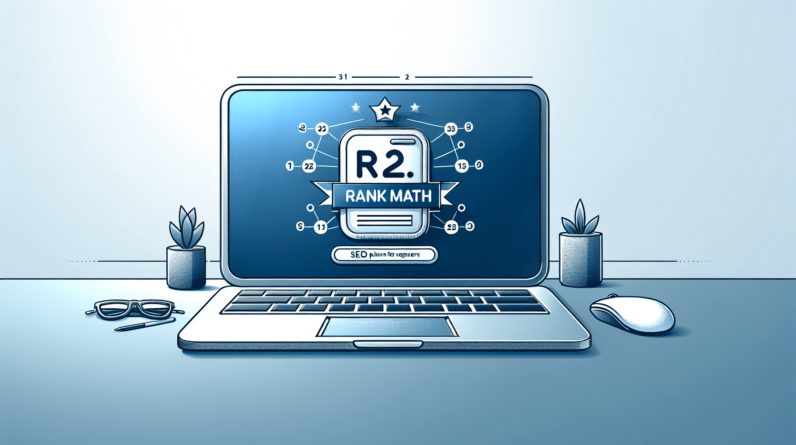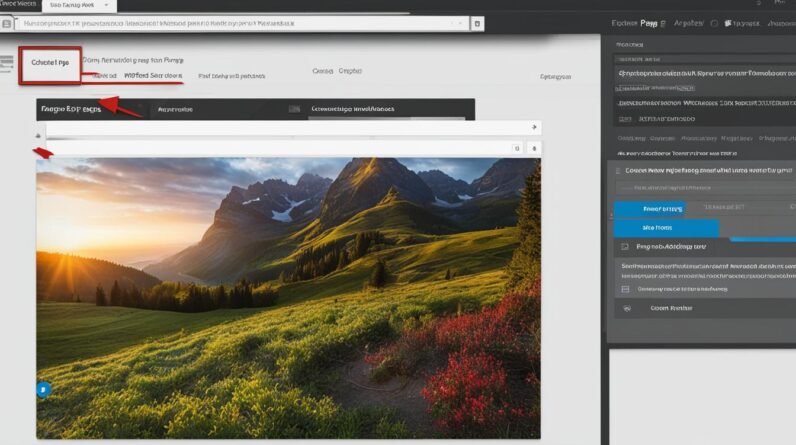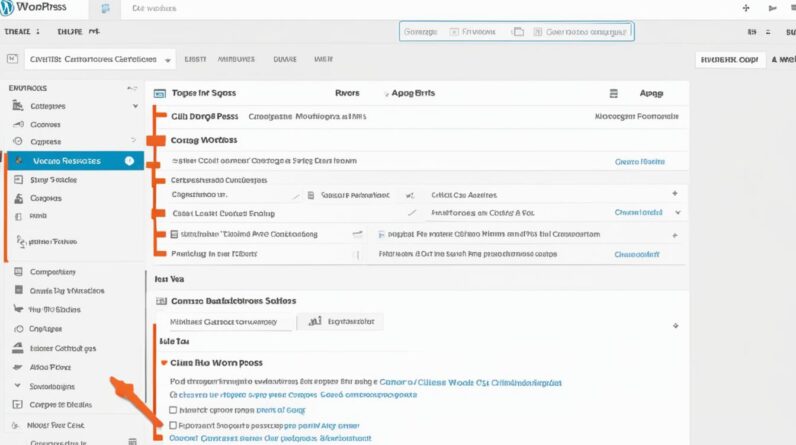Greetings! I’m here to guide you on how to backup your WordPress site effectively, ensuring the security of your valuable data. While WordPress is an incredibly powerful platform, it doesn’t have a built-in backup feature. That’s why creating regular backups is crucial to protect your site from security threats and the possibility of human errors.
How to Make Money with YouTube
Create an empire of automated video websites for multiple streams of income
Fortunately, there are various methods available to backup your WordPress site, whether you prefer to use a plugin or opt for manual backups through cPanel or FTP. In this guide, I will walk you through these different backup options, explaining their advantages and trade-offs, so you can choose the approach that suits your needs best.
Key Takeaways:
- Backing up your WordPress site is essential to safeguard your investment and protect against potential data loss.
- WordPress doesn’t have a built-in backup option, so you need to choose from various backup methods available.
- Backup plugins such as UpdraftPlus offer a user-friendly approach, while manual backups using cPanel or FTP provide more control.
- Consider the backup frequency, offsite storage, and secure backup location to ensure effective and secure backups.
- Choose reputable backup plugins like UpdraftPlus, Duplicator, or Jetpack VaultPress to support your backup strategy.
Why Backing Up Your WordPress Site is Important
Backing up your WordPress site is crucial because it protects your investment of time, energy, and money. It provides a safety net in case of data loss due to cyber attacks, server failures, human errors, or conflicts between plugins and themes. Losing your website data can be catastrophic for your business, so creating regular backups ensures that you can quickly recover and minimize any downtime.
The Importance of WordPress Backups
Backing up your WordPress site is not an optional task but a critical practice that every website owner should prioritize. Below are some key reasons why backups are important:
- Data Loss Causes: Various factors can lead to data loss on your WordPress site. It could be a malicious cyber attack, a server failure, accidental human errors, or conflicts between plugins and themes.
- Protecting Your Investment: Your website represents your time, energy, and financial investment. Losing its data means losing all the hard work you’ve put into building and maintaining it. Backups act as an insurance policy, providing you with the ability to restore your site quickly.
- Minimizing Downtime: If your website goes down due to data loss, it can result in significant downtime, affecting your online presence and potentially causing financial losses. Regular backups allow you to promptly recover your site, minimizing any disruptions.
By understanding the importance of WordPress backups, you can prioritize implementing a robust backup strategy to protect your website.
Data Loss Causes and the Role of Backups
When it comes to data loss, there are several common causes:
| Cause | Description |
|---|---|
| Cyber Attacks | Malicious hackers can target your website, compromising its security and leading to data loss or theft. |
| Server Failures | Technical issues or hardware failures within the server infrastructure can result in the loss or corruption of your website’s data. |
| Human Errors | Accidental deletions, misconfigurations, or improper handling of website data by individuals can lead to irreversible data loss. |
| Plugin/Theme Conflicts | Incompatibilities between plugins and themes can cause errors or crashes, resulting in data loss or website malfunctions. |
By regularly backing up your WordPress site, you create a safeguard against these potential threats, ensuring that you can restore your website to its previous state should any of these issues occur.
Types of WordPress Backups
When it comes to backing up your WordPress site, there are three main types of backups you can utilize: full backups, incremental backups, and differential backups. Each type offers unique advantages and considerations, allowing you to choose the method that best suits your needs.
Full Backups
A full backup, as the name suggests, includes all files, folders, and databases of your WordPress site. This comprehensive backup ensures that every piece of data is backed up, providing a complete snapshot of your site at a specific point in time. Full backups are ideal if you want to restore your site to its exact state before any issues or data loss occurred.
Incremental Backups
Incremental backups, on the other hand, only save new or changed files since the last backup. This type of backup focuses on capturing and storing the latest changes made to your site, resulting in smaller backup sizes and quicker backup times. Incremental backups are beneficial if you have a large website with frequent updates, as they optimize storage space and reduce backup duration.
Differential Backups
Differential backups store all changes made since the last full backup. Unlike incremental backups, which only capture the latest changes, differential backups capture all changes from the last full backup onward. This means that the backup size increases gradually over time, as it contains all changes since the most recent full backup. Differential backups are a suitable choice if you prioritize having a complete history of changes while still maintaining manageable backup sizes.
Choosing the right backup method depends on your specific requirements and resources. Consider factors such as the size of your website, the frequency of updates, and the available storage capacity. It’s essential to implement a backup strategy that ensures the safety and recoverability of your WordPress site.
Comparison of Backup Types
| Backup Type | Advantages | Considerations |
|---|---|---|
| Full Backups | Provides a complete snapshot of your site Allows for precise restoration |
Large backup file sizes Longer backup times |
| Incremental Backups | Smaller backup file sizes Faster backup times |
Requires previous full backup Restore process may take longer |
| Differential Backups | Contains changes since last full backup Retains complete change history |
Backup size increases over time Restore process may take longer |
By understanding the differences between full backups, incremental backups, and differential backups, you can make an informed decision about which backup method aligns with your WordPress site’s requirements. Whether you prioritize complete snapshots, lean backups, or comprehensive change history, implementing a reliable backup strategy is crucial for protecting your website’s data and ensuring a smooth recovery process when needed.
How to Backup Your WordPress Website Using a Hosting Platform
When it comes to backing up your WordPress website, utilizing a hosting platform can simplify the process and provide added convenience. Many managed WordPress providers, like Cloudways, offer built-in backup services as part of their plans. These backup services not only ensure the security of your site but also offer automation and flexibility in terms of scheduling and retention periods.
Cloudways, for instance, provides a comprehensive backup feature that allows you to schedule backups, choose the frequency, and select the retention period. This means you can set up automatic backups according to your preferred frequency, whether it’s daily, weekly, or monthly, ensuring that your site’s data is consistently protected. Additionally, you have control over how long the backups are retained, allowing you to keep multiple versions of your site’s backup.
By leveraging a hosting platform for backups, you can take advantage of their infrastructure and expertise, ensuring that your website’s backups are stored securely and accessible whenever you need them. Furthermore, hosting platforms often implement robust security measures to protect your data and backups from potential threats.
Hosting platforms provide a seamless backup experience, eliminating the need for additional plugins or manual processes. This streamlines the backup process and saves you time and effort, allowing you to focus on other important aspects of managing your WordPress site.
Advantages of Using a Hosting Platform for WordPress Backups
- Convenience: Backup services are integrated into your hosting platform, eliminating the need for separate backup plugins or manual backups.
- Automation: You can schedule automatic backups, ensuring that your site is backed up regularly without any manual intervention.
- Flexibility: Hosting platforms offer various options for backup frequency, allowing you to choose the intervals that best suit your site’s needs.
- Retention Control: You have the ability to determine how long backups are retained, ensuring that you have access to multiple restore points.
- Security: Hosting platforms implement robust security measures to protect your website’s data and backups from potential threats.
| Hosting Platform | Backup Automation | Backup Frequency | Retention Period |
|---|---|---|---|
| Cloudways | Yes | Daily, Weekly, Monthly | Customizable |
| WP Engine | Yes | Daily, Weekly | 30 Days |
| SiteGround | Yes | Daily, Weekly | Last 30 Copies |
As the table above illustrates, different hosting platforms offer varying backup automation, frequency, and retention period options. It’s crucial that you consider these factors when selecting a hosting platform for your WordPress site, ensuring that it aligns with your backup needs and preferences.
Overall, utilizing a hosting platform for your WordPress backups simplifies the process, increases convenience, and provides peace of mind knowing that your site’s data is secure and easily accessible.
How to Backup Your WordPress Website Using a Plugin
Using a backup plugin can be a simple and effective way to safeguard your WordPress site. One popular plugin that provides comprehensive backup solutions is UpdraftPlus. With UpdraftPlus, you have the flexibility to create full backups of your entire site or selectively choose specific files and databases to backup.
To begin the backup process using UpdraftPlus, follow these steps:
- Installation: First, you need to install and activate the UpdraftPlus plugin. Simply navigate to your WordPress dashboard, go to “Plugins” and click on “Add New.” Search for “UpdraftPlus” and click “Install Now.”
- Configuration: Once the plugin is installed, go to the “Settings” tab in your WordPress dashboard and select “UpdraftPlus Backups.” Here, you can set up the backup settings for files and databases. Choose your preferred frequency for backups, such as daily, weekly, or monthly. You can also specify the number of backups to retain.
- Initiating Backups: With UpdraftPlus, you have the option to manually initiate backups or schedule them to run automatically. To manually initiate a backup, go to “Settings” and click on “Backup Now.” UpdraftPlus will then create a backup of your website files and databases.
It’s important to note that UpdraftPlus offers various cloud storage options, allowing you to store your backups in services like Google Drive, Dropbox, or Amazon S3.
Backup Status and Restoration
After you’ve created backups using UpdraftPlus, you can easily manage and monitor their status. The plugin provides a clear overview of your backup history, including the date and time of each backup. If you ever need to restore your website using a backup, UpdraftPlus offers a simple restoration process.
Overall, using a backup plugin like UpdraftPlus simplifies the backup process and ensures that your website’s files and databases are protected. By taking advantage of the features and options available, you can have peace of mind knowing that you have a reliable backup in place.
How to Backup Your WordPress Site Manually
If you prefer a manual approach, you can backup your WordPress site using cPanel or an FTP client like FileZilla. Manual backups give you full control over the backup process, allowing you to choose specific files and folders to protect.
Backup using cPanel:
- Log in to your cPanel account.
- Locate the “File Manager” option.
- Navigate to the root directory of your WordPress site.
- Select all the files and folders you want to backup.
- Click on the “Compress” or “Zip” option to create a zip archive of your website files.
- Download the zip archive to your local storage for safekeeping.
Database Backup:
| Step | Description |
|---|---|
| 1 | Access your WordPress hosting account’s cPanel. |
| 2 | Find the “phpMyAdmin” option and click on it. |
| 3 | Locate your WordPress site’s database. |
| 4 | Select the database tables you want to backup. |
| 5 | Choose the “Export” option to export the selected tables as an SQL file. |
| 6 | Save the SQL file to your local storage for backup. |
Backup using FTP:
- Download and install an FTP client like FileZilla.
- Launch the FTP client and enter your FTP credentials (host, username, password, and port).
- Connect to your WordPress site.
- Navigate to the root directory where your WordPress files are located.
- Select all the files and folders, right-click, and choose “Download” to save them to your local storage.
By manually backing up your WordPress site using cPanel or an FTP client, you can ensure that your website files and database are protected and easily restorable in case of any issues.
Restoring a WordPress Site from Backup
Once you have created a backup of your WordPress site, you may need to restore it in case of any issues or data loss. It’s essential to have a reliable backup restoration process in place to ensure a seamless recovery.
One popular tool for restoring WordPress sites from backups is Duplicator Pro. With Duplicator Pro, you can easily restore your site from a backup with just a few simple steps.
In addition to basic restoration, Duplicator Pro offers advanced features such as recovery points and scheduled backups. Recovery points act as checkpoints, allowing you to restore your site to a specific previous version if needed. By scheduling regular backups using Duplicator Pro, you ensure that you always have a recent backup available for restoration.
When restoring your site from a backup, you will typically need a recovery URL. This URL is provided by Duplicator Pro and allows you to access the backup and initiate the restoration process effortlessly.
It’s worth noting that scheduled backups are crucial for maintaining the integrity of your site’s data. By configuring Duplicator Pro to regularly create backups according to your desired schedule, you ensure that your site’s information is always up to date and protected.
In the event of unexpected issues or data loss, the restoration process facilitated by Duplicator Pro and other similar tools can be a lifesaver. With a recent backup at hand, you can quickly recover your WordPress site and minimize any potential downtime.
Restoring a WordPress site from a backup is a critical step in maintaining the security and functionality of your website. Whether you encounter a security breach, encounter software issues, or accidentally delete crucial data, having a reliable backup and restoration strategy can save you time, effort, and potentially a great deal of stress.
Best WordPress Backup Plugins in 2023
In 2023, there are several top-notch WordPress backup plugins that can help you safeguard your website. These plugins offer a range of features to ensure the security of your data and make the backup process seamless. Let’s take a look at some of the best WordPress backup plugins to consider:
- UpdraftPlus: UpdraftPlus is a widely recognized and popular backup plugin. It allows you to create real-time backups, schedule automatic backups, and easily restore your site whenever needed.
- Duplicator: Duplicator is another excellent backup plugin that offers comprehensive backup and migration functionalities. It allows you to create complete backups of your site and even move it to a new domain or hosting provider with ease.
- BlogVault: BlogVault is a robust backup and security solution for WordPress websites. It provides real-time backups, incremental backups, and an easy-to-use dashboard for managing your backups and monitoring the security of your site.
- BackupBuddy: BackupBuddy offers a comprehensive backup solution for WordPress sites. It allows you to schedule automatic backups, store your backups on remote storage services like Google Drive or Dropbox, and quickly restore your site in case of any issues.
- Jetpack VaultPress Backup: Jetpack VaultPress Backup, powered by the popular Jetpack plugin, offers a seamless backup and security solution. It provides real-time backups, easy restoration, and additional security features to protect your site from potential threats.
Choosing the best WordPress backup plugin depends on your specific needs and preferences. Consider factors like the backup frequency, ease of use, storage options, and restoration process when making your decision. Remember, investing in a reliable backup plugin is crucial for the safety and protection of your valuable website data.
Best Practices for Backing up a WordPress Website
When it comes to backing up your WordPress website, following best practices is essential to ensure the effectiveness and security of your backups. By implementing these strategies, you can safeguard your site from potential data loss and minimize downtime. Let’s explore the key best practices for backing up a WordPress website:
- Determine the appropriate backup frequency: The backup frequency should be based on your site’s activity and how often it is updated. Websites with frequent content updates may require daily or weekly backups, while less active sites may need monthly backups. Assess your site’s needs and set a backup frequency accordingly.
- Store backups in an offsite location: Storing backups in an offsite location is vital to protect against disasters that may affect your primary server. Choose a secure offsite storage option, such as cloud storage services like Amazon S3, Google Drive, or Dropbox. This ensures that even if your server fails or gets compromised, you can still access and restore your backups.
- Regularly test backups: Testing your backups is crucial to ensure they can be successfully restored when needed. Periodically restore a backup to a test environment to verify its integrity and functionality. This helps uncover any potential issues and gives you peace of mind knowing that your backups are reliable.
- Choose a secure backup location: The security of your backup location is essential in protecting your sensitive data. Ensure that the storage location is encrypted, password-protected, and provides secure access controls. This prevents unauthorized access and ensures the confidentiality of your backups.
Test Backup Checklist
| Steps | Description |
|---|---|
| Step 1 | Choose a backup from your stored backups. |
| Step 2 | Restore the backup to a test environment. |
| Step 3 | Thoroughly check the restored site for any errors or issues. |
| Step 4 | Verify that all the site’s data and functionality are intact. |
| Step 5 | If any issues are found, troubleshoot and retest the backup until it restores properly. |
Following these best practices will ensure that your WordPress backups are reliable, secure, and readily available for restoration. By determining the appropriate backup frequency, storing backups in an offsite location, regularly testing backups, and choosing a secure backup location, you can protect your website and minimize the impact of any unforeseen events or data loss.
Summary
Creating regular backups of your WordPress site is crucial for protecting your investment and minimizing downtime in case of data loss or issues. By implementing a backup strategy, you can have peace of mind knowing that your site is always protected and can be restored quickly if needed. In this section, I will summarize the importance of WordPress backups, the benefits they provide, the different backup methods available, and the best practices to follow.
The Importance of WordPress Backups
Backing up your WordPress site is essential because it safeguards your investment of time, energy, and money. Websites are vulnerable to various risks, such as cyber attacks, server failures, human errors, and conflicts between plugins and themes. Losing your website data can be catastrophic, leading to downtime, loss of revenue, and damage to your brand reputation. By creating regular backups, you ensure that you have a recovery option in place and can quickly get your site back up and running.
The Benefits of Backups
Backups offer several benefits for your WordPress site:
- Protection against data loss: In case of accidental data deletion, hacking, or other issues, backups provide a copy of your site that can be restored.
- Quick recovery: With a recent backup, you can quickly restore your site to its previous state, minimizing downtime and reducing the impact on your business.
- Peace of mind: Knowing that your site is regularly backed up gives you peace of mind, allowing you to focus on other aspects of your business without worrying about potential data loss.
Different Backup Methods
There are various methods you can use to create backups of your WordPress site:
- Using a hosting platform: Many hosting providers offer backup services as part of their plans. These backups can be automated and provide flexibility in terms of scheduling and retention periods.
- Using a backup plugin: Backup plugins, such as UpdraftPlus, allow you to create full backups or choose specific files and databases to backup. Plugins usually have user-friendly interfaces and offer scheduling options.
- Manual backup: If you prefer a more hands-on approach, you can manually backup your site using cPanel or an FTP client like FileZilla. This method requires more technical knowledge but provides full control over the backup process.
Best Practices for WordPress Backups
To ensure the effectiveness of your WordPress backups, it’s important to follow these best practices:
- Determine backup frequency: The frequency of backups depends on your site’s activity and the frequency of content updates. Determine a backup frequency that strikes a balance between regularly capturing changes and minimizing resource usage.
- Store backups in an offsite location: Storing backups offsite adds an extra layer of security. Use remote servers, cloud storage, or external drives to store your backups.
- Test backups regularly: Regularly test your backups by restoring them on a separate environment. This ensures that the backups are functional and can be restored successfully if needed.
- Choose a secure backup location: Ensure that the backup location has proper security measures in place to prevent unauthorized access. Encrypt the backups if possible to further enhance security.

With the importance of WordPress backups, the benefits they provide, the different backup methods available, and the best practices to follow in mind, you can now confidently protect your WordPress site and be prepared for any potential issues or data loss.
Conclusion
Creating regular backups of your WordPress site is of utmost importance to protect your investment and minimize the impact of data loss or issues. It is crucial to choose the right backup method and implement best practices to ensure the security and effectiveness of your backups.
By utilizing a reliable hosting platform or a reputable backup plugin, you can simplify the backup process and automate the creation of backups. This not only saves time but also provides peace of mind, knowing that your website is backed up regularly.
Additionally, implementing backup best practices such as determining the appropriate backup frequency, storing backups in an offsite location, regularly testing backups, and securing your backup location, further enhances the reliability of your backup strategy.
Don’t underestimate the importance of backups. By taking the necessary steps to protect your WordPress site, you can rest assured that your investment is safeguarded and that you can quickly restore your website in case of any unforeseen events.
FAQ
How do I backup my WordPress site?
There are several methods you can use to backup your WordPress site, including using a backup plugin, manually backing up through cPanel or FTP, or utilizing a hosting platform’s backup services.
Why is backing up my WordPress site important?
Backing up your WordPress site is crucial because it protects your investment and ensures that you can quickly recover in case of data loss or issues caused by cyber attacks, server failures, human errors, or plugin/theme conflicts.
What are the different types of WordPress backups?
The three main types of WordPress backups are full backups, incremental backups, and differential backups. Each type has its advantages and trade-offs, so it’s important to choose the backup method that suits your needs best.
How can I backup my WordPress website using a hosting platform?
Many hosting platforms, such as Cloudways, offer backup services. You can automate backups, schedule their frequency and retention period, ensuring that your site and its backups are secure and easily accessible.
How can I backup my WordPress website using a plugin?
To backup your WordPress site using a plugin, you can install and activate a backup plugin like UpdraftPlus. Configure the plugin settings for file and database backups, then initiate backups manually or schedule them to run automatically.
How can I backup my WordPress site manually?
You can manually backup your WordPress site using cPanel or an FTP client like FileZilla. In cPanel, compress your website files into a zip archive and download it for backup. For database backup, use phpMyAdmin to export the database tables as an SQL file or connect to your site using an FTP client and download all the files to your local storage for backup.
How can I restore a WordPress site from a backup?
You can use tools like Duplicator Pro to easily restore your site from a backup. Set up recovery points, schedule automatic backups, and use these recovery points as checkpoints to restore your site to a specific previous version.
What are the best WordPress backup plugins in 2023?
Some popular options for WordPress backup plugins in 2023 include UpdraftPlus, Duplicator, BlogVault, BackupBuddy, and Jetpack VaultPress Backup. Each plugin offers various features such as real-time backups, automatic scheduling, and easy restoration.
What are the best practices for backing up a WordPress website?
To ensure the effectiveness of your WordPress backups, follow best practices such as determining the appropriate backup frequency, storing backups in an offsite location for added security, regularly testing backups to ensure successful restoration, and choosing a secure backup location to prevent unauthorized access.
Why are WordPress backups important?
WordPress backups are crucial for protecting your investment and minimizing downtime in case of data loss or issues. By implementing a backup strategy, you can have peace of mind knowing that your site is protected and can be restored quickly if needed.
How do I choose the right backup method for my WordPress site?
Choosing the right backup method for your WordPress site depends on your specific needs and resources. Consider factors such as automation, scheduling, ease of use, and backup storage options when selecting a backup method.






